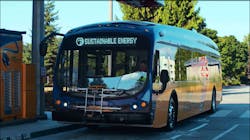Report highlights lessons learned from electric bus implementation
A new report from U.S. PIRG Education Fund, Environment America Research & Policy Center and Frontier Group highlights the experience of six early adopters of electric buses, illuminating the successes, challenges and lessons learned.
“Getting to school or commuting to work shouldn’t include a daily dose of toxic pollution,” said Sam Landenwitsch, senior vice president for The Public Interest Network, of which U.S. PIRG Education Fund and Environment America Research & Policy Center are members. “And why would we continue to use dirty diesel buses that are making the climate crisis worse?”
The report features case studies of six rollouts of electric buses, including in Seneca, South Carolina; Chicago; Seattle; Albuquerque; Twin Rivers, Calif.; and Amherst, Cambridge and Concord, Mass.
Chicago has been a success story. The Chicago Transit Authority (CTA) found that electric buses perform well in extreme weather conditions and have saved the transit authority more than $24,000 annually in fuel costs and $30,000 annually in maintenance costs. The city also estimates that each electric bus will save nearly $55,000 a year in healthcare expenses because fewer diesel buses means less pollution and cleaner air.
“Talking about transitioning to electric buses in terms of money makes it tangible, but undersells how important it is,” said Matt Casale, U.S. PIRG Education Fund Transportation Campaign director. “When you think about money, it almost sounds like some kid gets his asthma treatment paid for. But it's better than that. Instead, that kid doesn't have asthma.”
That’s just one of the valuable lessons that early adopters have learned and can share with other transit agencies and school districts considering electric buses. Transportation authorities need to account for local conditions -- including geography and climate -- to ensure that the buses can perform as needed. In addition, bus purchasers need to work with local utilities on rate structure revisions to prevent demand charges or other fees from undercutting the financial benefits of electric buses.
But these issues shouldn’t impede transitions to electric buses. Even Albuquerque, which faced the most significant challenges of the six cities studied, eventually cancelling its initial rollout of electric buses, recently announced it intends to relaunch its program by buying five new 40-foot electric buses for routes across the city.
“Every new technology goes through growing pains and electric buses are no different,” said James Horrox, policy analyst with Frontier Group and lead author of the report. "But the early experiences of cities that have adopted electric buses show that the hurdles can be overcome -- and that the payoff in cleaner air, better health and monetary savings can be massive.”
The report recommends that cities, transit agencies and school districts transitioning to electric buses learn from those who came before them. In addition, agencies should ensure that contracts with bus manufacturers have warranties if the vehicles delivered do not perform as promised. And after a successful pilot run, transit agencies and schools should invest in as large a fleet as possible to benefit from economies of scale.
“Electric buses are ready for prime-time and with thoughtful planning and execution, we can have zero-emission buses taking Americans to work and school everywhere in the country,” said Morgan Folger, Environment America Research & Policy Center’s clean cars program director. “The next generation of electric buses is ready to hit the road with groundbreaking new technology to help clean our air and promote healthier communities. There’s no need to cloud our landscape with diesel fumes ever again.”
